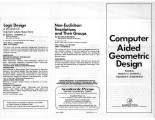Filters: Collection:"ir_uspace"
| Creator | Title | Description | Subject | Date | ||
|---|---|---|---|---|---|---|
| 1 |  | Sorensen, Justin Bruce | ARPANET timeline 1969-1980 | The University of Utah boasts of being the 4th node on the Advanced Research Projects Agency Network (ARPANET), a project funded by the Department of Defense that developed into the Internet and changed the world. However, when researchers came to the University of Utah's Marriott Library trying to... | ARPANET; Advanced Research Projects Agency Network; nodes | 2011-10-18 |
| 2 |  | Hu, Helen H.; Creem, Sarah H.; Gooch, Amy A.; Thompson, William B. | Visual cues for perceiving distances from objects to surfaces (Abstract) | An accurate perception of the distance between an object and a nearby surface can increase a viewer?s sense of presence in an immersive environment, particularly when a user is performing actions that affect or are affected by this distance. Two experiments were conducted examining the effectiven... | Distance perception; immersive environment | 2002-02-03 |
| 3 |  | Gopalakrishnan, Ganesh | Formalization and analysis of a solution to the PCI 2.1 bus transaction ordering problem: PVS files | The following PVS files are being put on our technical reports server and are available through anonymous FTP. Look for file "pci_pvs_files.tag.gz" in the TR directory. | Bus transaction; Ordering problem | 1999 |
| 4 |  | Peay, Wayne J.; Hess, Stephen H.; Sharp, Edward M. | Utah education network: a collaborative model | High-speed data communications networks are transforming the operations, services, and roles of libraries. While the installation of the physical network is often the focus of activity, the administrative and political issues are, in fact, fundamental. For libraries to participate in and influence t... | Utah Education Network | 1994-10 |
| 5 |  | Parker, Steven G.; Johnson, Christopher R. | Interactive manipulation of contour data using the layers program | The "layers" program is useful for visualizing and editing large sets of contour data. These datasets arise frequently when trying to extract geometry from MRI slices. Due to the imprecise nature of the MR imaging and segmentation processes, the contours extracted may not accurately reflect the huma... | Contour data; Layers program; MRI slices | 1994 |
| 6 |  | Riesenfeld, Richard F. | Computer aided geometric design | This book contains the edited proceedings of the first International Conference on Computer Aided Geometric Design, an important new field that draws on the principles of computer science, mathematics, and geometric design. The list of contributors includes most of the leading researchers in the... | Computer aided geometric design | 1973 |
| 7 |  | Cotter, Neil E. | Prejudicial search and backprop | This paper introduces the combination of backward error propagation and prejudicial search. Prejudicial search is a method, which like simulated annealing, guarantees convergence to a global minimum as time approaches infinity. Unlike simulated annealing, its application is more flexible because it ... | 1991 | |
| 8 |  | Sikorski, Kris | A note on optimal algorithms for fixed points | We present a constructive lemma that we believe will make possible the design of nearly optimal 0(dlog | ) cost algorithms for computing eresidual approximations to the fixed points of d-dimensional nonexpansive mappings with respect to the infinity norm. This lemma is a generalization of a two-... | Fixed points; Constructive lemma | 2009 |
| 9 |  | Kniss, Joe; Ikits, Milan; Lefohn, Aaron; Hansen, Charles D. | Closed-form approximations to the volume rendering integral with Gaussian transfer functions | In direct volume rendering, transfer functions map data points to optical properties such as color and opacity. We have found transfer functions based on the Gaussian primitive to be particularly useful for multivariate volumes, because they are simple and rely on a limited number of free paramet... | Volume rendering | 2003-07-25 |
| 10 |  | Industrial revolutions: from canal systems to computer networks | Today's so-called "Information Revolution" is often compared to past industrial revolutions, especially a British Industrial Revolution which took place between 1750 and 1830 and a Second Industrial Revolution which is believed to have occurred in the United States between 1880 and 1940. The compari... | Information technology; Information Age | 2000 | |
| 11 |  | Breaderson, Dean J. | The I3Stick: an inexpensive, immersive, interaction device | Virtual environments require interaction devices that are intuitive and ergonomic, yet capable of many input parameters. Many devices satisfying these requirements can be expensive, difficult to manipulate, and often require the integration of large software libraries with existing applications. We ... | Virtual environments; I3Stick; Interaction devices | 1999 |
| 12 |  | Henderson, Thomas C. | Reaction-diffusion processes as a computational paradigm | Turing introduced reaction diffusion systems (RD-systems) as a mechanism which made possible the differentiation of morphological structure. We have shown how these systems can be used to provide an information network for smart sensor systems. However, we propose here that reaction diffusion system... | Reaction diffusion systems; RD-systems; Computational paradigm | 2000 |
| 13 |  | Henderson, Thomas C. | Utah range database | This document describes in detail the range database provided by the Department of Computer Science at the University of Utah. This document is intended for the person(s) involved in installing the database and those using the database. The images are in four sets: the University of Utah images, SR... | Utah range database | 1986 |
| 14 |  | Lyche, Tom | A note on the Oslo algorithm | The Oslo algorithm is a recursive method for updating the B-spline representation of a curve or tensor product surface when extra knots are added. In the present note the derivation of this method is simplified. | Oslo algorithm; B-spline; Curve product surface; Tensor product surface | 1987 |
| 15 |  | Boll, Steven F. | Improving linear prediction analysis of noisy speech by predictive noise cancellation | The analysis of speech using Linear Prediction is reformulated to account for the presence of acoustically added noise and a technique is presented for reducing its effect on parameter estimation. The method, called Predictive Noise Cancellation (PNC), modifies the noisy speech autocorrelations ... | Linear prediction; Predictive Noise Cancellation; Noisy speech; Sppech analysis | 1977 |
| 16 |  | Brunvand, Erik L. | Speed without fear: composable self-timed GaAs circuits | We have designed a set of self-timed gallium arsenide building blocks that are suitable for composing into larger systems. Systems designed using these modules can be easier to design and modify than their globally clocked counterparts, while maintaining high performance. The modules are suitable ... | Gallium arsenide circuits; Self-timed | 1993 |
| 17 |  | Michell, Nick | A gallium arsenide mutual exclusion element | A mutual exclusion element is a key component in building asynchronous and self-timed circuits. As part of our effort to design high performance self-timed circuits, we have designed a mutual exclusion element in gallium arsenide. This circuit has been fabricated in a 1.2? process and tested. A test... | Mutual exclusion element; Self-timed circuits | 1993 |
| 18 |  | Durney, Carl H. | A computer graphics method for solving transcendental equations | There are a number of ways to determine the values of x which satisfy the equation F(x)=0. (The case of interest here is that in which F i s a complex function of the complex variable x.) One way is to search for values of x which make Real (F(x)) and Imaginary (F(x)) both zero at the same time wher... | Transcendental equations | 1970 |
| 19 |  | Henderson, Thomas C. | Agent-based engineering drawing analysis | Interpretation of paper drawings has received a good deal of attention over the last decade. Related areas such as direct interpretation of human drawings (HCI), search and indexing of graphics databases, and knowledge representation in the domain of graphics and drawing understanding have also s... | Interpretation; Human drawings; HCI; Graphic databases | 2002-02-04 |
| 20 |  | Henderson, Thomas C. | Apparent symmetries in range data | A procedure for extracting symmetrical features from the output of a range scanner is described which is insensitive to sensor noise and robust with respect to object surface complexity. The acquisition of symmetry descriptors for rigid bodies from a range image was in this case motivated by the ne... | Symmetry descriptors; Range data; Range scanner; Dextrous manipulation systems | 1987 |
| 21 |  | Henderson, Thomas C. | Leadership protocol for S-Nets | Smart Sensor Networks are collections of non-mobile devices (S-elements) which can compute, communicate and sense the environment; they must be able to create local groups of devices (S-cliques). We propose here a protocol to solve the leadership problems for S-Nets. We sketch the correctness of thi... | Smart Sensor Networks; S-Nets | 2001 |
| 22 |  | Henderson, Thomas C.; Meek, Sanford G. | Task defined grasp force solutions | Force Control for dextrous manipulation has been approached algebraically with a great deal of success, however, the computational burden created when such approaches are applied to grasps consisting of many contacts is prohibitive. This paper describes a procedure which restricts the complexity of ... | grasp force; dextrous manipulation | 1988 |
| 23 |  | Johnson, Christopher R. | Techniques for visualizing 3D unstructured meshes | We present a computational module for interactively visualizing, large-scale, 3D unstructured meshes. Scientists and engineers routinely solve large-scale computational boundary value problems on unstructured grids. These grids typically range from several hundred thousand elements to millions of el... | 3D unstructured meshes; Visualization | 1994 |
| 24 |  | Carter, John B. | The avalanche myrinet simulation package | This is a user manual for version 2.0 of the Myrinet simulation package. Users of the V2.0 package can specify arbitrary network topologies composed of Myrinet switches with different number of ports. For example, 4-port and 32-port switches can be used in a single system. Because the V2.0 model sup... | Avalanche Myrinet; Simulation Package; User manual; Myrinet switches; port switches | 1996 |
| 25 |  | Keller, Robert M. | Semantics of networks containing indeterminate operators | We discuss a denotational semantics for networks containing indeterminate operators. Our approach is based on modelling a networks by the set of all its possible behaviors. Our notion of behavior is a sequence of computational actions. The primitive computational action is an event: the appearance o... | 1984 |
